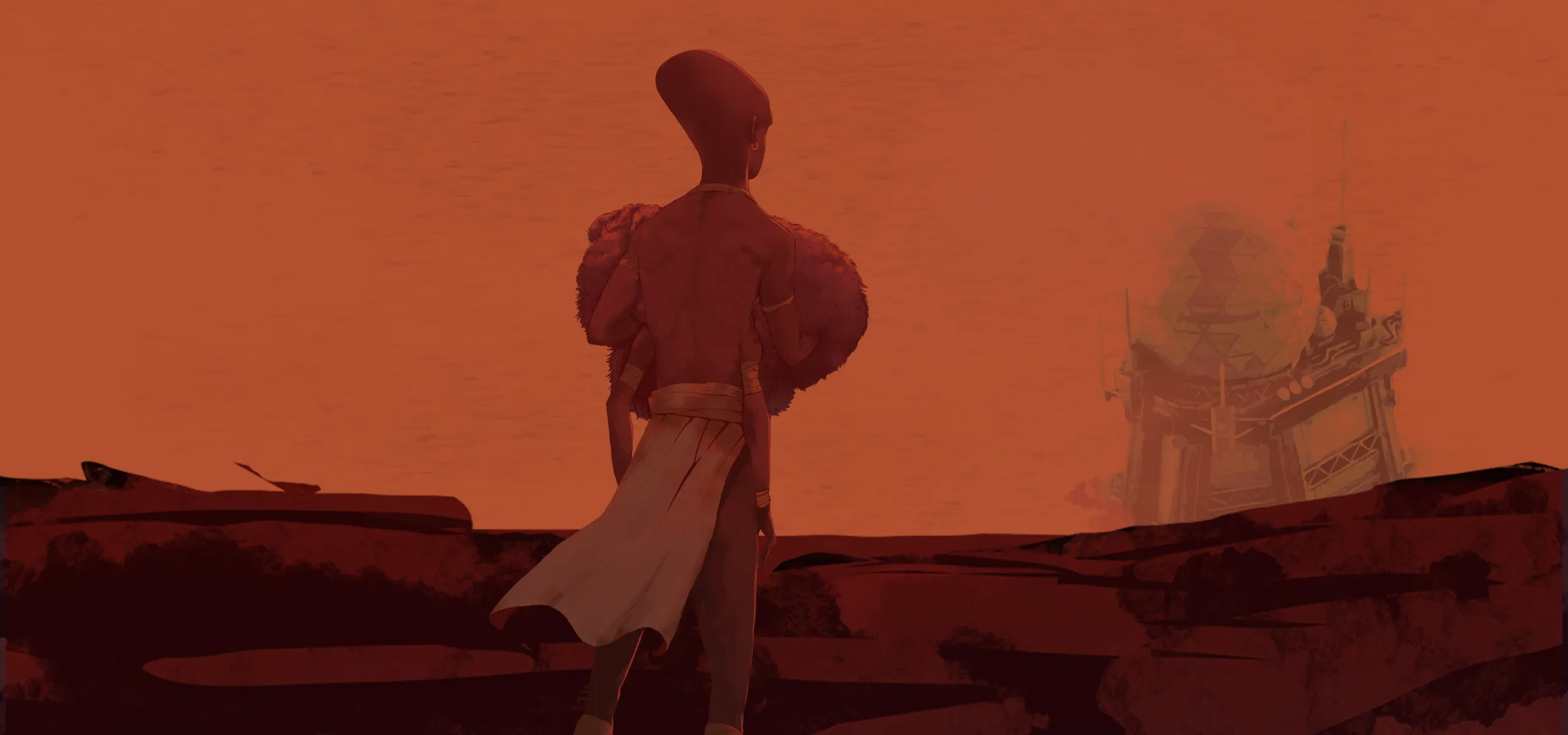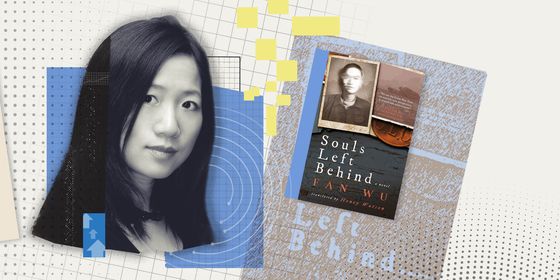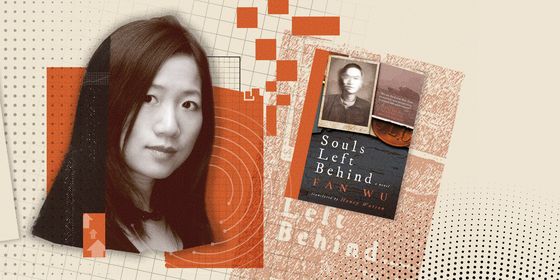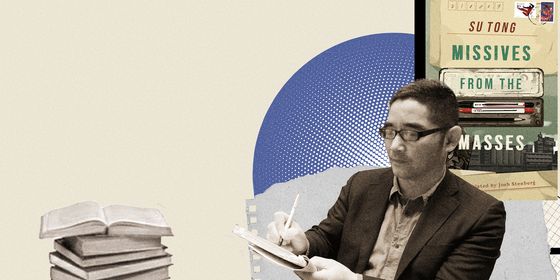Author Tang Fei spins a yarn about alien sheep and intergalactic ties that bind
1
Quite a sense of relief. The jet of water cut a full arc through the air, landed in front of her feet, and rushed merrily down into the ground. Like a small shiny snake, it quickly burrowed into the sand, leaving only a wet mark behind.
Yah’din gave a long, comfortable sigh and felt no hurry to get up. The wind had died down. Quiet. It was a fine day—up above, a sky lucent like egg white, and down below, a land of endlessly undulating red sand. Between the sky and the sand, there was Yah’din, squatting in the shade of a sandstone cliff with her bum out. Her bum felt cold; it was as bare and natural as the rocks on the ground. She heard movement behind her, a rapid rustle, like the sound of winds rushing through the tops of bushes. Yah’din pulled up her pants and looked toward the noise—it was her sheep. A red ball of curly wool stumbled and wobbled toward her, stretching out its head, looking all focused and serious.
Yah’din laughed, ran toward the sheep, and scooped it up. The sheep was exhausted. It gave her face a rub with the wet tip of its black nose, and then just laid close to her chest, collapsing into a small mass of softness and warmth, as if there were no bones in its body. Yah’din stroked its back again and again, repeating over and over “Ah, Sheep. Ah, Sheep.” Her voice rose and fell with the heaving of the small body in her arms, or maybe it was the small body that rose and fell with the ebb and flow of her voice. Anyway, one naturally matched the other, as Yah’din’s voice traveled across the vast wilderness. Yah’din’s Ma said she pampered the sheep so much that it became too needy and could never be separated from people.
Yah’din buried her face in the sheep’s wiry wool. A hot leathery smell immediately rose to her face, and suddenly she became wide awake. “You are the last one. Be as needy as you like,” Yah’din whispered next to the sheep’s head.
There was only this one sheep left in all Longgu’er. People all said that when Great Granny was a girl, she could sit in the yurt and watch the sheep herders lead hundreds of sheep rushing by. Even when they were far away, you could already feel the ground shake beneath you and the furniture rattle like crazy. Like rumbling thunder that rolled closer and closer, thousands of hooves the size of bowls stamped across the ground, kicking up a sandstorm, as if a giant red river came rushing from the sky. Whenever Yah’din thought about that spectacle, her blood boiled with excitement, but she also ended up feeling depressed. After all, she had never witnessed it, and she had never seen a real grown sheep. As for the many children born after her, they had never even heard of such things.
Yah’din had never dreamed that one day she would have a sheep. On that day, she held the sheep in her arms the whole night, not willing to let go even when it shit and pissed. People asked her what she would call it, and she said just Sheep; it’s the only one so there are no others to mix it up with. Fifteen years flew by, and Yah’din had grown up. Yet the sheep only grew a little, just reaching people’s knees. Things told in the legend—hooves the size of bowls and a body as tall as a person—were nowhere to be found.
It wasn’t like Yah’din didn’t worry about this. She asked around for tips on keeping sheep in a world that no longer had any sheep. The old sheep herders were all gone; the paintings in all the sandstone caves, big and small, were all eroded by the wind; the yarn paintings found in peoples’ homes were too dirty to tell what they depicted.
She recalled what the man had said when he gave her the sheep: feed it pure liquid water, bathe it in the sun, and walk it. Simple as that, nothing more. Nothing could go wrong. When she worried so much that she turned and tossed in her bed, the sheep’s almond-shaped black eyes saw through it all. When she lay on her back, the sheep, front legs leading the hind legs, jumped onto her, exhuming pride and energy. Its big eyes came close to her face and there was no trace of fear in them. What a beautiful sheep! Yah’din realized her sheep was just fine. After that, she never felt worried about the sheep again.
The alarm around her neck made a beeping sound. Time to fetch water. Yah’din hurried home to get the bucket from her yurt. Since spring, fetching water meant traveling several Long’rian miles. The old well had dried up completely.
She bumped into her Ma on her way out and instinctively, she turned her shoulders to shelter the sheep.
“Slow down!“ Ma shouted.
“I can’t. I have to be back in a bit to mend the yurt and plant the blue crystals.”
“There’s no hurry. I’ll wait for you.”
“I can’t. I have a schedule. If this is late, everything later will be all wrong.” She had already run so far that her Ma didn’t even hear the last sentence she said. Yah’din gasped for breath. She had said all this for her own benefit anyway. She was the one who wanted to learn from the outsiders, doing things in order and with plans. She bought a beeper and carefully set a schedule—starting such a task at such a time and finishing such a task at such a time.
But after a whole year, she was still all fingers and thumbs. From birth to death, people who grew up in a yurt never looked at a clock or used a beeper. Every day they just did whatever they were supposed to do. Their hands and feet just kept moving, and the things that needed to be done just happened like water that flowed naturally. One after another, they all got done. The Long’rians didn’t understand time, and they didn’t understand how something that had existed as long as the world could be cut into equal parts. Yah’din was different. She had resolved to learn to do things according to a schedule so that she could one day go outside and see the world. Yet making up her mind was easy; her body and brain still had catching up to do. Every day, she felt like she was being driven from task to task and got tired without knowing why.
She hadn’t considered the extra distance she had to cover to fetch water when she had made her schedule. Yah’din told herself that she needed to hurry up. She started to run, and the sheep began to bounce in her arms. Lucky that she had four arms, two for holding the bucket and two for holding the sheep; otherwise, she could never have managed it. Luckily the sheep was behaving now, just curling up and not moving. In the past, the sheep always poked its neck out and looked around, ready to snarl at whatever annoyed it. Now it knew more about the world so it became much quieter, and its body also got a lot heavier, as if the weight of silence was placed squarely on its back.
2
The water level had dropped again. They had to dig new wells. Yah’din straightened her back and carefully laid down the sheep. The sheep bent its hind legs, wobbled for a step or two, and plumped down. It leaned on the wall of the well to wait for her.
First, Yah’din dropped a bag of de-solidifier into the well and waited for the water inside to liquefy. She lowered the bucket into the water, filled it, and then pulled it back up. While she pulled the bucket up, the water inside it solidified again. Yah’din put the two buckets next to each other and climbed on top of the hill next to the well. She looked west and saw a block of green shrubs standing to attention on top of the red sand. So someone had been charitable again. The Public Welfare Forest had grown much bigger since she last saw it. The outsiders were keen on fixing Longgu’er’s sandland problem.
If someone donated the money for a shrub, the tree planter would plant one here. The shrubs sucked up water like crazy, and they were aggressive. Where they grew, no other grasses could; even the sandland animals avoided them. But the outsiders didn’t know. Yah’din scratched her head and looked around. Her lower set of hands went into her pocket and then slowly came back out. Some blue powder fell out of her pocket along the way. The Long’rians called it the blue crystal, a type of sand bacteria used for making de-solidifying and decomposing agents. Since time unknown, there had been a rumor among the children that blue crystals could stop the shrubs, and so there was always some child who spread blue crystals around the border of the shrubbery when the adults turned their backs.
“You are almost twenty. Why do you still fool around?” Yah’din’s Ma had spotted the blue powder around the edge of her pocket when she got home and given her a good talking-to.
“I checked and made sure there was no surveillance drone when I spread it,” Yah’din quibbled, knowing that if people really meant business, the surveillance satellite would have recorded her little trick.
“Reckless. It’s useless. Waste of blue crystal. As if you didn’t know there aren’t enough to go around at home.”
The beeper interrupted Ma. Time to mend the yurt. Yah’din took out the two buckets of solidified water and put them into the water storage, while her two other hands were weaving thread in preparation. Ma had already started mending the yurt. As she was berating Yah’din with verbal rapid-fire, her needles and thread followed the pace of her speech, so she had already mended the largest hole while speaking. The yurt was made from the skins of hundreds of sand lyre worms. It was light, thin, sturdy, transparent, and bug-repellant. Even so, it was no match for the gravel that flew around in a storm. Every now and then, they had to check the yurt. If they found any scratch marks, they immediately sewed it up. It would be too late if you waited until there was actually a hole in it. Yah’din had been doing this since she was a little girl, and her four hands were as nimble as Ma’s—as long as she did not distract herself by stroking the sheep nearby. Yah’din pushed her needle in against one scratch mark.
“I heard that houses outside do not need to be mended every day.”
“Me and your Pa won’t stop you. But don’t expect us to clean up after you.” Ma glimpsed at the sheep. The sheep laid its head on Yah’din’s legs, sleeping again.
“Sheep leaves with me.”
Ma’s four hands stopped. “You’re taking the sheep? You probably won’t be able to board the car to the liaison station, let alone a spaceship. You don’t even know what it’s like out there and you want to bring it with you?” Ma swallowed what she meant to say after that.
Yah’din broke Ma’s heart, so she dared not look at her and just stroked the sheep with her head lowered. The sheep raised its head and snuggled her hand with its wet nose. “You don’t know that, not without trying. Besides, no rule says you can’t bring a sheep,” Yah’din mumbled.
Ma’s hands moved again. “Two more months and you’ll be twenty, then you can do whatever you want.” The sheep moved into her arms, rubbed its face on her clothes, and licked her lazily. Yah’din held it and rubbed its back. If it had not been for Sheep, she probably wouldn’t want to go. Poor Sheep. All alone by itself. Yah’din wanted it to meet other sheep. She wanted to see a world with many sheep. But none of this could be said. A tree-planting drone flew past the yurt, leaving a lingering whooshing noise in its wake.
Ma stretched out a hand to beckon the sheep. The sheep didn’t budge. Yah’din put down the sheep and gently pushed it toward Ma. The sheep wobbled for a bit, steadied itself, and then stumbled on. Ma didn’t bother to wait. Instead, she held out her arms to lift the sheep onto her knees. She measured the sheep with colored thread. “I’ve got to make a rucksack for it, so you can travel with it on your back and don’t stand out too much. Next market day you should ask around to find out if they allow sheep on cars and spaceships.”
Yah’din found it even harder to look Ma in the eye. She picked up a ball to play with the sheep. The sheep waved its legs, moved close to the ball, and lay down at Yah’din’s feet. Sheep glanced at the ball, lowered its head, and stayed put. Yah’din frowned. “What’s the matter with it? It used to pester me all the time to play catch with it. Ma—is Sheep going to have little sheep?”
Ma pricked her finger with a needle and laughed.
Threads in the Cosmos | Short Story is a story from our issue, “Online Odyssey.” To read the entire issue, become a subscriber and receive the full magazine.














